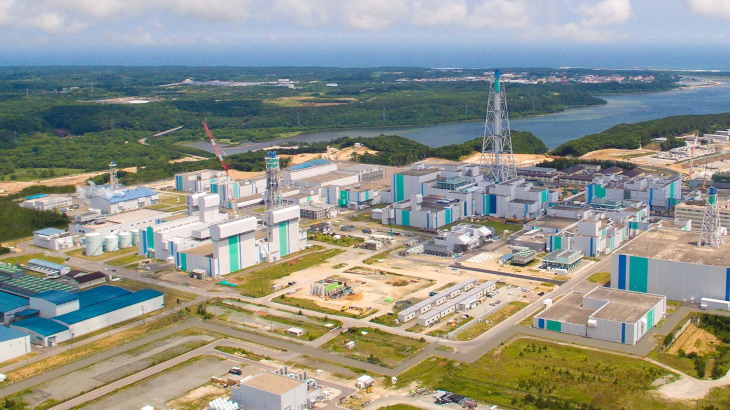The Rokkasho reprocessing plant (Image: JNFL)
JNFL said it decided to revise the completion date of plant due to the ongoing conformity review for Design and Construction Plans and construction works to enhance safety complying with new regulatory requirements. It informed Aomori prefecture and Rokkasho village of its decision on 7 September last year. The governor of Aomori prefecture requested JNFL to provide a "cause analysis of the delay in the conformity review and countermeasures" and a "way to the completion of the Rokkasho reprocessing plant".
The company announced on 26 December that it has formulated responses as requested by the governor of Aomori prefecture and sets the completion date of the plant as "the earliest possible time in the first half of FY2024" (the financial year which begins in April 2024). It said this timescale is "based on a comprehensive judgement, considering the three elements - construction works, conformity review for Design and Construction Plans and inspections".
JNFL noted that the Nuclear Regulation Authority's (NRA's) approval of the first part of the Design and Construction Plans on 21 December "was a big step toward the completion". The company applied for the approval of the second part of Design and Construction Plans on 26 December, noting that the plant is now "in the final stage toward completion".
Delays in the approval of the first part of the Design and Construction Plans had been caused by insufficient communication with the NRA as well as insufficient information sharing and collaboration "among sections involved", JNFL said. "JNFL was not able to judge that the modifications of already approved contents and initial design of Design and Construction Plans were necessary. Deeper understanding about the part of regulatory requirement and more detailed technical and multidimensional check were required."
It added, "JNFL arranges systematically all the equipment based on each article of rules on technical standards, and proceeds with the second part review efficiently with continued communication with the NRA and close information sharing and collaboration among sections involved."
The company said its expects the conformity review for Design and Construction Plans to take about one year, and the inspection period after the approval to be 4 to 7 months.
Construction of the Rokkasho reprocessing plant began in 1993 and was originally expected to be completed by 1997. However, its construction and commissioning have faced several delays. The facility is based on the same technology as Orano's La Hague plant in France. Once operational, the maximum reprocessing capacity of the Rokkasho plant will be 800 tonnes per year, according to JNFL.
Following the March 2011 accident at the Fukushima Daiichi nuclear power plant, new safety standards for nuclear fuel cycle facilities came into force in December 2013. The requirements vary from facility to facility, but generally include reinforcement measures against natural threats such as earthquakes and tsunamis, and in some cases tornadoes, volcanoes and forest fires. Reprocessing plants need to demonstrate these as well as countermeasures specifically against terrorist attacks, hydrogen explosions, fires resulting from solvent leaks and vaporisation of liquid waste.
On 29 July 2020, JNFL received permission from the NRA for the modification of safety measures at the Rokkasho reprocessing plant. Additional equipment and systems are being installed for the recovery of radioactivity in the event of a severe accident. Additional safety-related countermeasures are also being put in place, such as internal flood protection, strengthening of the seismic resistance of pipework and improving measures against internal fires.
